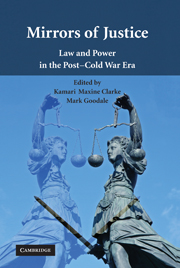Book contents
- Frontmatter
- Contents
- Editor Biographies
- Contributors
- Acknowledgments
- Introduction: Understanding the Multiplicity of Justice
- 1 Beyond Compliance: Toward an Anthropological Understanding of International Justice
- PART I JUSTICE AND THE GEOGRAPHIES OF INTERNATIONAL LAW
- PART II JUSTICE, POWER, AND NARRATIVES OF EVERYDAY LIFE
- 7 The Victim Deserving of Global Justice: Power, Caution, and Recovering Individuals
- 8 Recognition, Reciprocity, and Justice: Melanesian Reflections on the Rights of Relationships
- 9 Irreconcilable Differences? Shari'ah, Human Rights, and Family Code Reform in Contemporary Morocco
- 10 The Production of “Forgiveness”: God, Justice, and State Failure in Post-War Sierra Leone
- PART III JUSTICE, MEMORY, AND THE POLITICS OF HISTORY
- Epilogue: The Words We Use: Justice, Human Rights, and the Sense of Injustice
- Index
- References
10 - The Production of “Forgiveness”: God, Justice, and State Failure in Post-War Sierra Leone
Published online by Cambridge University Press: 25 January 2010
- Frontmatter
- Contents
- Editor Biographies
- Contributors
- Acknowledgments
- Introduction: Understanding the Multiplicity of Justice
- 1 Beyond Compliance: Toward an Anthropological Understanding of International Justice
- PART I JUSTICE AND THE GEOGRAPHIES OF INTERNATIONAL LAW
- PART II JUSTICE, POWER, AND NARRATIVES OF EVERYDAY LIFE
- 7 The Victim Deserving of Global Justice: Power, Caution, and Recovering Individuals
- 8 Recognition, Reciprocity, and Justice: Melanesian Reflections on the Rights of Relationships
- 9 Irreconcilable Differences? Shari'ah, Human Rights, and Family Code Reform in Contemporary Morocco
- 10 The Production of “Forgiveness”: God, Justice, and State Failure in Post-War Sierra Leone
- PART III JUSTICE, MEMORY, AND THE POLITICS OF HISTORY
- Epilogue: The Words We Use: Justice, Human Rights, and the Sense of Injustice
- Index
- References
Summary
While the United States is fighting a rearguard action to limit the jurisdiction of the new International Criminal Court over American citizens, it is bankrolling a Special Court to deal with atrocities in Sierra Leone which is far from universally popular there…So far there has been little public enthusiasm for the Court. The Sierra Leonean people have shown themselves to be amazingly forgiving, but they are also very fatalistic…They undoubtedly feel that there should be some accounting for these terrible tragedies, but in the spirit of peace and reconciliation many feel that it is for God or Allah to determine retribution.…The Court has been set up with the best of intentions. But is it right to pursue the prosecutions in Sierra Leone at this time, when the wounds of the conflict are still so raw and the peace so fragile?…Do those involved realise that this is not just the exercise of justice, but something which has profound political and security implications? If the Special Court goes ahead it must be managed most carefully by officials, the government and the international community, otherwise the peace could be seriously undermined and even broken.
(Peter Penfold, Guardian Unlimited, October 20, 2002)Are Sierra Leoneans so fatalistic as to believe that justice for those responsible for the violence that they have lived with for the last decade can only be administered by God?…What kind of restitution does someone who has had their hands chopped off hope for and expect? What justice is there for children who have watched their parents and siblings being mutilated and killed or, worse still, who themselves were forced to participate? […]
- Type
- Chapter
- Information
- Mirrors of JusticeLaw and Power in the Post-Cold War Era, pp. 208 - 226Publisher: Cambridge University PressPrint publication year: 2009
References
- 3
- Cited by



